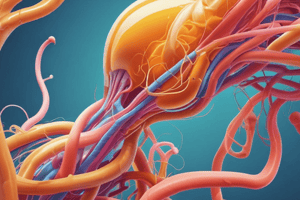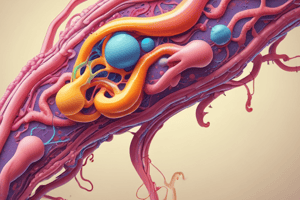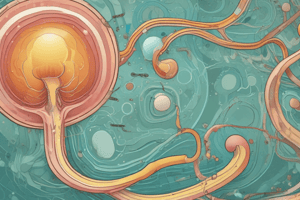Podcast
Questions and Answers
What is the primary function of the kidneys in the urinary system?
What is the primary function of the kidneys in the urinary system?
- Produce urine through filtration
- Clear substances from the blood (correct)
- Transport waste to the bladder
- Store urine before excretion
Which component of the urinary system is responsible for transporting urine from the kidneys to the bladder?
Which component of the urinary system is responsible for transporting urine from the kidneys to the bladder?
- Bladder
- Kidneys
- Urethra
- Ureters (correct)
What is the role of the bladder in the urinary system?
What is the role of the bladder in the urinary system?
- To filter blood and produce urine
- To collect and store urine (correct)
- To transport urine to external environment
- To regulate fluid balance in the body
Which part of the urinary system is a thin tube that facilitates the passage of urine to the external environment?
Which part of the urinary system is a thin tube that facilitates the passage of urine to the external environment?
How many kidneys are generally present in the human body?
How many kidneys are generally present in the human body?
What is the primary function of a nephron in the kidney?
What is the primary function of a nephron in the kidney?
How many nephrons are typically found in a single healthy adult kidney?
How many nephrons are typically found in a single healthy adult kidney?
Which statement accurately describes the capability of a nephron?
Which statement accurately describes the capability of a nephron?
Which component is found in the glomerulus?
Which component is found in the glomerulus?
What characterizes a nephron as a unit in the kidney?
What characterizes a nephron as a unit in the kidney?
What element is NOT part of the tubule system?
What element is NOT part of the tubule system?
What can each nephron in a kidney do on its own?
What can each nephron in a kidney do on its own?
Which of the following tubules is involved in urine concentration?
Which of the following tubules is involved in urine concentration?
How many main types of tubules are listed in the content?
How many main types of tubules are listed in the content?
Which of the following is NOT part of the tubules according to the provided content?
Which of the following is NOT part of the tubules according to the provided content?
What is the main regulatory function of the kidneys?
What is the main regulatory function of the kidneys?
Which ion is primarily involved in reabsorption during the excretory function of the kidneys?
Which ion is primarily involved in reabsorption during the excretory function of the kidneys?
In cases of acidosis, how do the kidneys maintain pH balance?
In cases of acidosis, how do the kidneys maintain pH balance?
What role does erythropoietin play in the body?
What role does erythropoietin play in the body?
What is the primary purpose of detoxification in the kidneys?
What is the primary purpose of detoxification in the kidneys?
What type of urine sample is most likely to contain higher levels of proteins?
What type of urine sample is most likely to contain higher levels of proteins?
Which mineral is included in the list of substances typically found in urine?
Which mineral is included in the list of substances typically found in urine?
What is the significance of phosphate in urine?
What is the significance of phosphate in urine?
Which of the following is NOT typically considered a type of urine sample?
Which of the following is NOT typically considered a type of urine sample?
What is the purpose of collecting the first morning urine sample?
What is the purpose of collecting the first morning urine sample?
When is the bladder typically emptied in relation to urine collection?
When is the bladder typically emptied in relation to urine collection?
Why might low concentration substances be of interest in a morning urine sample?
Why might low concentration substances be of interest in a morning urine sample?
What does the collection of a morning urine sample specifically help to identify?
What does the collection of a morning urine sample specifically help to identify?
What does collecting urine after emptying the bladder at bedtime prevent?
What does collecting urine after emptying the bladder at bedtime prevent?
Flashcards
Kidney function
Kidney function
Kidneys filter substances from the blood, removing waste.
Ureters role
Ureters role
Ureters carry urine from kidneys to bladder.
Bladder function
Bladder function
Bladder stores urine until release.
Urethra pathway
Urethra pathway
Signup and view all the flashcards
Renal system organs
Renal system organs
Signup and view all the flashcards
Nephron function
Nephron function
Signup and view all the flashcards
Nephron Structure
Nephron Structure
Signup and view all the flashcards
Number of nephrons in kidney
Number of nephrons in kidney
Signup and view all the flashcards
Kidney Unit
Kidney Unit
Signup and view all the flashcards
Nephron individual function
Nephron individual function
Signup and view all the flashcards
Kidney's main function
Kidney's main function
Signup and view all the flashcards
Kidney's excretory role
Kidney's excretory role
Signup and view all the flashcards
Kidney's pH regulation
Kidney's pH regulation
Signup and view all the flashcards
Kidney's metabolic role
Kidney's metabolic role
Signup and view all the flashcards
Kidney's endocrine function
Kidney's endocrine function
Signup and view all the flashcards
Glomerulus
Glomerulus
Signup and view all the flashcards
Bowman's capsule
Bowman's capsule
Signup and view all the flashcards
Proximal Convoluted Tubule
Proximal Convoluted Tubule
Signup and view all the flashcards
Loop of Henle
Loop of Henle
Signup and view all the flashcards
Distal Convoluted Tubule
Distal Convoluted Tubule
Signup and view all the flashcards
Morning Urine Sample
Morning Urine Sample
Signup and view all the flashcards
Why Morning Urine?
Why Morning Urine?
Signup and view all the flashcards
Low Concentration Substances
Low Concentration Substances
Signup and view all the flashcards
Urine Collection Timing
Urine Collection Timing
Signup and view all the flashcards
Detection of Low Substances
Detection of Low Substances
Signup and view all the flashcards
Urine Components
Urine Components
Signup and view all the flashcards
Urine Sample Types
Urine Sample Types
Signup and view all the flashcards
Sample Collection Method?
Sample Collection Method?
Signup and view all the flashcards
Reason for Specific Sample
Reason for Specific Sample
Signup and view all the flashcards
Why Analyze Urine?
Why Analyze Urine?
Signup and view all the flashcards
Study Notes
Urine Composition
- Urine is 95% water and 5% solutes.
- Organic substances include non-protein nitrogenous compounds, proteins, sugars, hormones, vitamins, and enzymes.
- Inorganic substances include chloride, phosphate, sulphates, calcium, potassium, and sodium.
Urinary System Organs
- Kidneys are bean-shaped organs responsible for clearing substances from the blood.
- Ureters are channels that transport urine from the kidneys to the bladder.
- The bladder collects and stores urine.
- The urethra is the tube that passes urine to the external environment.
Nephron Structure
- Nephrons are the functional units of the kidney.
- A healthy adult has approximately 1,200,000 nephrons per kidney.
- Each nephron forms urine independently.
- Nephrons consist of glomerular capillaries, Bowman's capsule, and convoluted tubules.
Urine Formation Steps
- Filtration occurs in the glomerulus; the process is non-selective.
- Tubular reabsorption is selective, occurring in the tubules, where substances are reabsorbed into the blood.
- Tubular secretion is also selective, occurring in the tubules, where substances are secreted into the urine.
Kidney Functions
- Excretory function: Removal of metabolic waste products.
- Regulatory function:
- Maintaining extracellular fluid volume and blood pressure.
- Regulating ions (e.g., Na+, H+, Cl−, NH3).
- Maintaining pH (by conserving or eliminating substances).
Kidney Functions (Continued)
- Endocrine function: Secretion of hormones such as erythropoietin and renin.
- Metabolic function:
- Detoxification: Converting toxic substances to less toxic forms and eliminating them.
- Vitamin D3 activation.
Hormonal Regulation
- Anti-diuretic hormone (ADH) regulates water reabsorption.
- Aldosterone regulates water and sodium reabsorption.
- Parathyroid hormone regulates calcium reabsorption.
Homeostasis and Renal Threshold
- Homeostasis is the tendency of biological systems to maintain a balanced internal environment.
- Kidneys play a critical role in regulating homeostasis through reabsorption and excretion (balancing act).
- Renal threshold represents the kidney's maximum capacity for reabsorption.
- If a substance's concentration in the blood exceeds the renal threshold, the body excretes that substance in urine. E.g., glucose.
Types of Urine Samples
- Morning urine samples are collected before bed, detecting low concentration substances.
- Random urine samples are collected anytime, used in routine exams.
- Mid-stream urine samples are collected to avoid contamination from initial urine, for urine cultures.
- 24-hour urine samples are used to assess the amount of certain substances in daily urine.
Studying That Suits You
Use AI to generate personalized quizzes and flashcards to suit your learning preferences.



